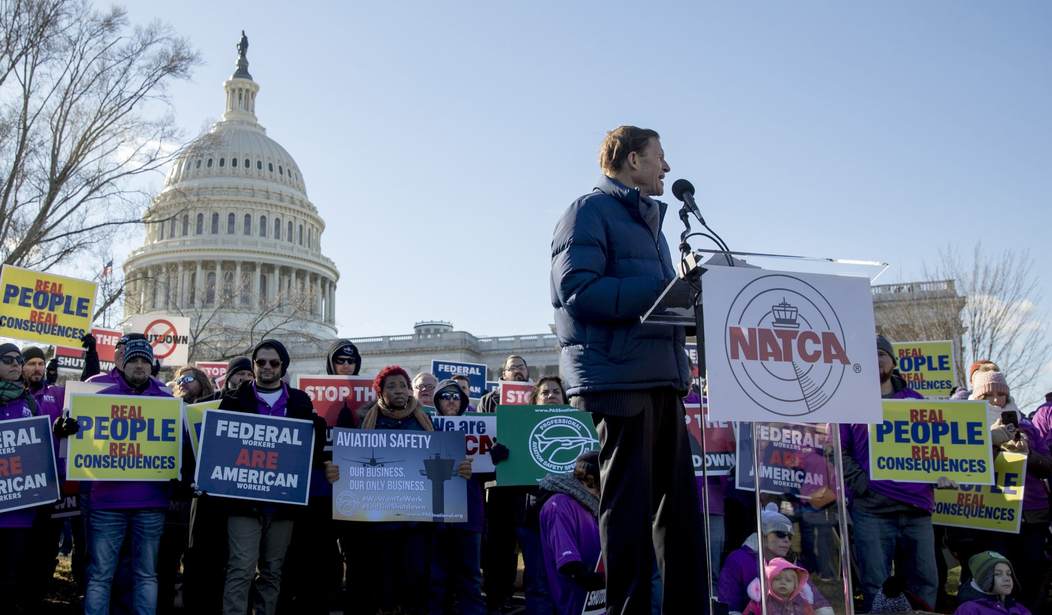As the government shutdown took its toll, Washington, D.C., assumed the unfamiliar aspect of a city going through hard times. “It’s like a ghost city — totally dead. … When other parts of the country suffered during the Great Recession, the area around the nation’s capital boomed.” But now the shoe is on the other foot.
As the country nears the end of its third week of a government shutdown, the consequences of Washington’s political dysfunction are landing right on the city’s doorstep. The Washington metro area is home to the largest number of federal workers in the country, and as their paychecks begin to stop, the negative effects threaten to spread across the region.
This is an unusual problem for a region that boasts one of the country’s richest, strongest economies, powered by government spending and a large, stable federal work force. …
as long as the shutdown ended before February, the economic effect on the overall region would be minimal … the longer the shutdown went on, the higher chance it would cause more lasting damage.
The question everybody is asking is: who will blink first? Trump or Congress? It seems apparent that neither can afford to. It has been evident for some time that the Left will settle for nothing else but the president’s head. Within a few short months special counsel Mueller will publish his report and the Democrat-dominated House will take it to impeachment. While conviction by a Republican Senate seems unlikely, Donald Trump has nothing to lose by hanging tough on the wall issue, knowing if he blinks the circling pack will be upon him in a moment.
The Democrats appear to be equally committed. Nancy Pelosi announced there will be no retreat from the position of not funding a border wall. “President Donald Trump abruptly walked out of a closed-door meeting with congressional leaders Wednesday in the White House Situation Room after Speaker Nancy Pelosi, D-Calif., said she wouldn’t fund his border wall even if he ended the government shutdown.”
Colby Itkowitz of the Washington Post lays out 5 ways the government shutdown could end.
- Trump simply caves;
- Congress overrides Trump’s veto of any funding bill that does not include a border wall;
- Congress gives Trump a down payment on the wall but not the full amount the president has asked for;
- “The Democrats could revive their deal from last year that would have exchanged $25 billion toward a border wall for a path to citizenship for Dreamers”;
- “Neither side folds and the agencies remain shut down through the end of 2020, when there’s a presidential election”.
CNN reports that Republican senators are trying to work out a deal as envisaged by Options 3 and 4. But given the life and death stakes of the conflict, Options 2 and 5 are not inconceivable. No deal but victory or defeat by a trial of strength.
The endurance of each side — who can hold out the longest — may settle the outcome. Which will be is hard to predict. Military history is full of examples showing that antagonists have often underestimated the staying power of their foes even while overestimating their own. Both sides in WW1 thought they would be “home before the leaves fall.” Perhaps nothing illustrates how this can still happen better than the knock-down-drag ’em-out Brexit battle, featuring betrayals and reversals of fortune that have extended the fight beyond anything imaginable. The trench warfare of Brexit was described by a member of parliament.
Make no mistake, Britain is on the brink. This week Parliament will re-start the debate on the Prime Minister’s Brexit Deal, having lost a month. In all likelihood, the House of Commons will vote down a deal that deserves to be defeated. Parliament is deadlocked. Our country is bitterly divided. It is no exaggeration to say we face the greatest political and constitutional emergency we’ve had in peacetime. This is not in response to any external threat or challenge. The tragedy is we have done this to ourselves. But, because of that, we can step back from the brink. It doesn’t have to be like this. There is still time to change course.
But of course no one is likely to change course in Britain any more than the parties now locked in political conflict in France will stop. The protests against cutbacks in government payouts to the French middle class have now dragged on for so long they are damaging that nation’s economy. People have discovered by hard experience that the underlying issues in Britain and France are too deep-seated to be resolved quickly. No one will be home before the leaves fall. Brexit and the fuel tax protest merely ripped off the bandages that concealed a festering wound.
Chuck Todd articulated the fears of those in the capital when he wrote that though “we’ve been here before — Congress and the Trump White House facing a potential government shutdown — and each time the major players have backed away from the brink. But this time feels different, with the government’s funding expiring on Saturday.”
Perhaps this shutdown feels dangerous because as with events in Britain and France it threatens to evolve into something else. In both countries the crisis has amplified the influence of formerly unknown factors in the political debate. There are wildcards in the deck.
Gilets jaunes activists have reportedly destroyed over half of France’s speed cameras in protest against speed limits introduced last year. Up to 65 per cent of the cameras have been smashed, set ablaze, blown up, painted or covered with the yellow jackets that give the movement its name, The Times reports.
Under crisis conditions, factors which didn’t use to matter can take on an unanticipated significance. What changed both for Congress and Trump is the band of uncertainty for any given response has now increased. By taking such uncompromising positions each has submitted its hostages to fortune. The flip side of commitment is a loss of control. With both somewhat at the mercy of events, who will have the high hand?
Follow Wretchard on Twitter
For a list of books most frequently purchased by readers, visit my homepage.
Support the Belmont Club by purchasing from Amazon through the links below.
Books:
Custer’s Trials: A Life on the Frontier of a New America, by T.J. Stiles. Winner of the 2016 Pulitzer Prize in History, this book paints a portrait of Custer that demolishes historical caricature, revealing a volatile, contradictory, intense person — capable yet insecure, intelligent yet bigoted, passionate yet self-destructive, a romantic individualist at odds with the institution of the military (he was court-martialed twice in six years). The key to understanding Custer, Stiles writes, is keeping in mind that he lived on a frontier in time. In the Civil War, the West, and many other areas, Custer helped to create modern America, but could never adapt to it. Stiles casts surprising new light on a near-mythic American figure, a man both widely known and little understood.
Tribe: On Homecoming and Belonging, by Sebastian Junger. We have a strong instinct to belong to small groups defined by clear purpose and understanding or “tribes,” a connection now largely lost. But its pull on us remains and is exemplified by combat veterans who find themselves missing the intimate bonds of platoon life at the end of deployment and the high rates of post-traumatic stress disorder suffered by military veterans today. Combining history, psychology, and anthropology, Junger explores what we can learn from tribal societies about loyalty, belonging, and the eternal human quest for meaning. He explains why we are stronger when we come together, and how that can be achieved even in today’s divided world.
For a list of books most frequently purchased by readers, visit my homepage.
Did you know that you can purchase some of these books and pamphlets by Richard Fernandez and share them with your friends? They will receive a link in their email and it will automatically give them access to a Kindle reader on their smartphone, computer or even as a web-readable document.
The War of the Words, Understanding the crisis of the early 21st century in terms of information corruption in the financial, security and political spheres
Rebranding Christianity, or why the truth shall make you free
The Three Conjectures, reflections on terrorism and the nuclear age
Storming the Castle, why government should get small
No Way In at Amazon Kindle. Fiction. A flight into peril, flashbacks to underground action.
Storm Over the South China Sea, how China is restarting history in the Pacific
Tip Jar or Subscribe or Unsubscribe to the Belmont Club










Join the conversation as a VIP Member